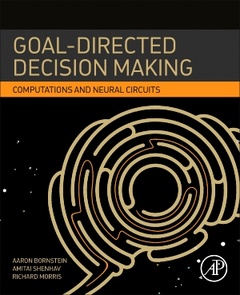Goal-Directed Decision Making Computations and Neural Circuits
Coordonnateurs : Morris Richard W., Bornstein Aaron, Shenhav Amitai

Goal-Directed Decision Making: Computations and Neural Circuits examines the role of goal-directed choice. It begins with an examination of the computations performed by associated circuits, but then moves on to in-depth examinations on how goal-directed learning interacts with other forms of choice and response selection. This is the only book that embraces the multidisciplinary nature of this area of decision-making, integrating our knowledge of goal-directed decision-making from basic, computational, clinical, and ethology research into a single resource that is invaluable for neuroscientists, psychologists and computer scientists alike.
The book presents discussions on the broader field of decision-making and how it has expanded to incorporate ideas related to flexible behaviors, such as cognitive control, economic choice, and Bayesian inference, as well as the influences that motivation, context and cues have on behavior and decision-making.
1. Actions and Habits: Psychological Issues in Dual Process Theory
Computations 2. Instrumental Divergence and Goal-Directed Choice 3. Temporal Dynamics of Goal-Directed Decision Making 4. Episodic Memory Influences on Goal-Directed Decision Making 5. Structure Learning 6. Simulation and Evaluation in Deliberative Decision Making 7. Competition and Cooperation between Multiple RL Systems
Neuroscience 8. Cortical Determinants of Goal-Directed Action 9. Distinct Functional Microcircuits in the Nucleus Accumbens Underlying Goal-Directed Decision Making 10. Striatal Cholinergic Interneurons and Goal-Directed Learning 11. Dopaminergic Prediction Errors and the Acquisition of Model-Based Behavior 12. The Role of the Orbitofrontal Cortex in Reinforcement Learning and Goal-Directed Decision Making
Applications 13. The Development of Goal-Directed Decision Making 14. Social Behavior 15. Goal-Directed Deficits in Psychosis 16. Goal-Directed Action in Disorders of Compulsivity 17. Drug Addiction: Augmented Habit Learning or Failure of Goal-Directed Control? 18. Alpha-Go
Open Questions 19. Realigning Models of Habitual and Goal-Directed Decision Making 20. Motivations of Action and Reward
Dr Aaron M. Bornstein was trained in mathematics and computer science before obtaining his PhD in Cognition & Perception from New York University. His work has helped us understand how decision-making can be understood in computational terms, merging ideas from computational reinforcement learning with the rich understanding of learning and memory systems in the brain to investigate multiple forms of goal-directed choice. Beginning at NYU and continuing into his current position at the Princeton Neuroscience Institute, he has distinguished important cortical and subcortical contributions to learning and decision-making and his reviews have helped forge a rapprochement across the disparate fields of psychology, neuroscience and computer science.
Amitai Shenhav earned a B.A. in Cognitive Science from UC Berkeley in 2005 and a Ph.D. in Psychology from Harvard University in 2012. After completing his graduate work, he was a C.V. Starr Postdoctoral Fellow at Princeton University before arriving at Brown. His research investigates neural and computational mechanisms at the intersection of decision-making and cognitive control.
- Details the neural circuits functionally involved in goal-directed decision-making and the computations these circuits perform
- Discusses changes in goal-directed decision-making spurred by development and disorders, and within real-world applications, including social contexts and addiction
- Synthesizes neuroscience, psychology and computer science research to offer a unique perspective on the central and emerging issues in goal-directed decision-making
Date de parution : 08-2018
Ouvrage de 484 p.
19x23.3 cm
Thèmes de Goal-Directed Decision Making :
Mots-clés :
Action; Addiction; Agency; Alcohol; Bayesian; Behavior; Case-based reasoning; Causal learning; Choice; Cholinergic interneurons; Cognitive control; Compulsivity; Contingency degradation; Cortex; Decision; Decision-making; Delta-opioid receptors; Development; Dopamine; Drift-diffusion model; Drive theory; Eating habits; Emotional prediction errors; Episodic future thinking; Episodic memory; Exploration; Extrahippocampal coordinate system; Generalization; Glutamate; Goal-directed action; Goal-directed behavior; Goal-directed control; Goal-directed learning; Goal-directedness; Habit; Habits; Hedonic; Hierarchical reinforcement learning; Hippocampus; Incentive theory; Inferior parietal lobule; Instrumental conditioning; Instrumental divergence; Instrumental learning; Insular; Learning; Maze; Model-based; Model-free; Motivation; Neuroeconomics; Neuroscience; Nucleus accumbens shell; Obsessive-compulsive disorder; Operant; Orbitofrontal cortex; Orbitofrontal; Outcome devaluation test; Outcome devaluation; Outcome revaluation; Pavlovian conditioning; Pavlovian-instrumental interactions; Pavlovian-instrumental transfer; Place cells; Place field; Prediction error; Prefrontal; Prosocial goals; Psychosis; Psychostimulants; Reinforcement learning; Reinforcement; Representation learning; Reward; Reward-based decision-making; Rodent; Rule learning; Similarity; Social-affective control model; South arm; Structure learning; Substance abuse; Transdiagnostic approach; Translational research; US processes theory



